11 APRIL 2011
YOUR WORDS
Readers are invited to add their comments to any story. Click on the article to see and add.
BTN DISTRIBUTION
BTN also goes out by email every Sunday night at midnight (UK time). To view this edition click here.
- COMMENT: From planes to trains
- Australia's Virgin Blue goes two-class
- Baltic Air Charter supports "Help for Heroes"
- British Airways increase fuel surcharge
- Cargo revamp for British Airways and Iberia
- Expedia and American Airlines
- Flying Matters crashes
- Holiday Inn opens in Downtown Toronto
- Hong Kong gains the world's "highest" hotel
- Irish problems manifest
- Jordan goes for Hilton
- London City - Palma route expanded
- Lufthansa revamps its Boeing 747 cabins
- Paris to Capetown non-stop
- Skyteam appoints new Managing Director
- South American rush continues
- Stansted to Corfu
- TAM goes on London taxis
- United States publishes 2010 visitor figures
- Virgin Atlantic's new in-flight kit
- World Airport Awards include Stansted
- ON TOUR: Aircraft Interiors Expo Hamburg
- MOTORING UPDATE by Ted Wilkinson
- AND FINALLY: The Vickers Viscount
The Business Travel News
PO Box 758
Edgware HA8 4QF
United Kingdom
info@btnews.co.uk
© 2022 Business Travel News Ltd.
Australia's Virgin Blue goes two-class
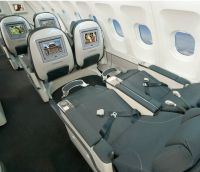 26 May has been set by Virgin Blue, Australia’s second largest airline, for the introduction of a full two-class wide-bodied operation on its domestic services.
26 May has been set by Virgin Blue, Australia’s second largest airline, for the introduction of a full two-class wide-bodied operation on its domestic services.
The airline will shortly take delivery of the first of four Airbus A330 aircraft that will be used on the five-hour sector between Perth and Sydney featuring a 27-seat dedicated 2+3+2 Business Class with a fully reclining seat offing 62 inches of pitch. The airline’s “The Lounge” pay as you go facility is part of the Business Class product. Passengers throughout the aircraft will be offered the latest IFE (in-flight entertainment) system with films, TV and audio. The airline's 737s and Embraers operate with Economy and Premium Economy to differentiate with the superior A330. Virgin Blue competes against Qantas with Boeing 767s.
Virgin Blue was launched with typical Richard Branson flamboyance in August 2000. The Virgin Group now holds 25% interest and Air New Zealand 14.7%. The airline serves 28 cities in Australia, with Brisbane Airport as its hub, using a current fleet of 75 Boeing 737 and Embraer e-series aircraft. www.virginblue.com.au
Cargo revamp for British Airways and Iberia
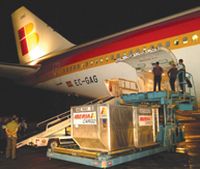 Following the merger of British Airways and Iberia, the airlines’ cargo operations will be run as a single business unit reporting to International Airlines Group (IAG), the holding company created by the merger.
Following the merger of British Airways and Iberia, the airlines’ cargo operations will be run as a single business unit reporting to International Airlines Group (IAG), the holding company created by the merger.
The combined business will be one of the 10 largest air cargo carriers worldwide and will be led by Steve Gunning as Managing Director and Ignacio Díez Barturen as Deputy Managing Director. They were previously Managing Directors of BA World Cargo and Iberia Cargo respectively.
Both airlines will keep their brands and their employees will continue to work for their current airline but staff and customers will be watchful to see how the integration works out with one eye on the future as far as passenger sales go. There will be a small cargo management team within IAG. www.baworldcargo.com www.iberia.com
Holiday Inn opens in Downtown Toronto
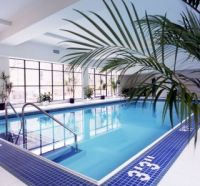 Toronto continues with a surge of planned and actual hotel openings (see last week’s AERBT) with the Holiday Inn Toronto Downtown Centre now welcoming visitors.
Toronto continues with a surge of planned and actual hotel openings (see last week’s AERBT) with the Holiday Inn Toronto Downtown Centre now welcoming visitors.
The new hotel is Canada’s largest Holiday Inn property with 513 rooms over 23 floors and features 9,000sq ft of modern, multi-functional event space. The project is part of the US$1bn Holiday Inn global brand re-launch.
Located at 30 Carlton Street in the Downtown Yonge neighbourhood, the hotel is steps away from Toronto’s historic landmark Maple Leaf Gardens and within walking distance of the Eaton Centre, Ryerson University and hundreds of restaurants and businesses. The hotel is three miles from the Billy Bishop waterfront airport and 16 miles from Pearson International. www.holiday-inn.com
Jordan goes for Hilton
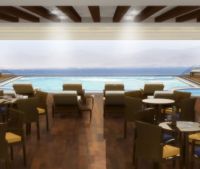 Hilton Worldwide has made its debut in Jordan with the opening of the DoubleTree by Hilton Aqaba. With views over the Red Sea it is located in the central business district of Jordan’s southernmost city and only port, within walking distance of popular seashore attractions and all major shopping areas. The newly built 173-room hotel has been designed to welcome guests with contemporary style, an array of upscale amenities and warm Arabian hospitality.
Hilton Worldwide has made its debut in Jordan with the opening of the DoubleTree by Hilton Aqaba. With views over the Red Sea it is located in the central business district of Jordan’s southernmost city and only port, within walking distance of popular seashore attractions and all major shopping areas. The newly built 173-room hotel has been designed to welcome guests with contemporary style, an array of upscale amenities and warm Arabian hospitality.
Named by the Arab Tourism Ministers’ Council as the Arab Tourism Capital for 2011, Aqaba is particularly well known for its resort lifestyle amongst intra-regional travellers, as well as European holidaymakers, who often stay while also visiting cultural and eco-adventure destinations such as Wadi Rum, Petra and the Red Sea.
The DoubleTree by Hilton Aqaba is located just 15 minutes from King Hussein International Airport (AQJ). More than 220m² of exclusive meeting and event space is available for business meetings, conferences or social receptions of up to 130 people. The hotel features a semi-covered, infinity-style swimming pool and fitness centre. http://doubletree1.hilton.com
Paris to Capetown non-stop
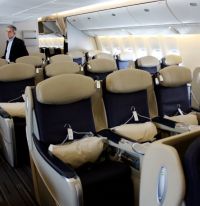 Capetown is to become Air France’s 12th new destination launched in 2011. From 3 November the French national airline will operate three weekly frequencies to Africa’s most southerly city. It is the country's legislative capital and the seat of the South African Parliament. Flights will be serviced by a Boeing 777-200 with 35 seats in the Business Premier, 24 in Premium Voyageur and 250 in the Voyageur cabin.
Capetown is to become Air France’s 12th new destination launched in 2011. From 3 November the French national airline will operate three weekly frequencies to Africa’s most southerly city. It is the country's legislative capital and the seat of the South African Parliament. Flights will be serviced by a Boeing 777-200 with 35 seats in the Business Premier, 24 in Premium Voyageur and 250 in the Voyageur cabin.
Air France introduced the Airbus A380 on the daily Johannesburg route in February 2010.
This new route launch is part of Air France/KLM Group’s expansion policy on the African continent, with four new destinations in 2011: Bata (Equatorial Guinea), Cape Town (South Africa), Freetown (Sierra Leone) and Monrovia (Liberia). These new destinations bring the number of cities in Africa served in winter 2011 to 38. www.airfrance.com
Stansted to Corfu
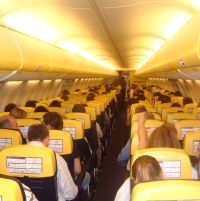 Ryanair, which some people call “the most annoying airline in the world”, seems to be on the expansion trail again out of Stansted, albeit in a small way.
Ryanair, which some people call “the most annoying airline in the world”, seems to be on the expansion trail again out of Stansted, albeit in a small way.
Starting from July this year the airline will introduce a twice weekly service from Stansted to Corfu. The airline now offers four Greek connections - Stansted to/from Corfu, Rhodes and Thessaloniki and Liverpool to/from Kos.
Corfu is currently served with daily flights from Luton by easyJet, and also by Monarch from Gatwick. Flight time is around 3hr 20 minutes.
Corfu is the most westerly island of Greece with Brindisi and the Italian mainland opposite across the Ionian Sea. It has a population of just 33,000 and was once controlled by the Venetians, and later, the British. www.ryanair.com
Virgin Atlantic's new in-flight kit
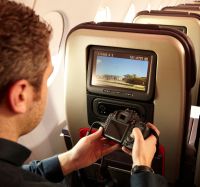 Panasonic and Virgin Atlantic have released more details of the in-flight entertainment system (IFE) that went into service last week with the introduction of the airline’s new Airbus A330 aircraft (www.aerbt.co.uk/#3279). Passengers in all classes will be able to plug in a USB to view their own content. Destination videos are also available amongst many other features. For those that do not want to use the touch screen the handset is in the seatback and not in the traditional airline position using the armrest. An email system using travellers own Blackberries and PDAs will be introduced later.
Panasonic and Virgin Atlantic have released more details of the in-flight entertainment system (IFE) that went into service last week with the introduction of the airline’s new Airbus A330 aircraft (www.aerbt.co.uk/#3279). Passengers in all classes will be able to plug in a USB to view their own content. Destination videos are also available amongst many other features. For those that do not want to use the touch screen the handset is in the seatback and not in the traditional airline position using the armrest. An email system using travellers own Blackberries and PDAs will be introduced later.
For the business traveller one of the innovations is “Live News from Sky”. You can browse as if on the ground. In addition to this, Sky News Radio and Sky Sports Radio bulletins are available hourly.
With the new system Virgin have introduced what is claimed to be a world’s first, allowing passengers to "rate" movies, music and other features with a simple thumbs up/down option. Travellers can provide real feedback on what they like and do not like, which will allow the airline to tailor its entertainment to better suit their needs. www.virgin-atlantic.com
MOTORING UPDATE by Ted Wilkinson
Sharan Sets New Standards
Plus a brief test of the Peugeot RCZ
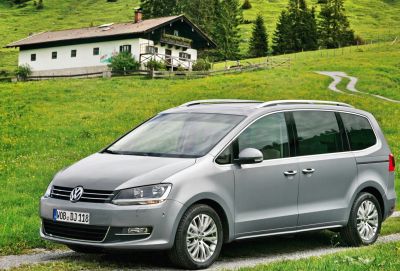 More generously proportioned, more user-friendly, more practical, more efficient (lighter in weight than its predecessor) and mechanically vastly advanced.
More generously proportioned, more user-friendly, more practical, more efficient (lighter in weight than its predecessor) and mechanically vastly advanced.
That’s the new Volkswagen Sharan Multi Purpose Vehicle.
Just when Crossover vehicles seemed to be grabbing all the attention Volkswagen has come up trumps with a most sensible product. I feel it is stylish without any suggestion of being cumbersome. It is a sensible package.
The Sharan’s technology is based on Volkswagen’s highly acclaimed Bluemotion efficiency technology and currently for the UK market there is a choice of two petrol and two diesel engines, the less potent being partnered by a well ratioed, easy changing 6-speed gearbox as standard with the top 198 bhp 2.0-litre petrol version equipped with the selectable DSG automatic transmission. The latter unit can also be specified as a cost-extra option of some other versions.
Four trim versions are offered, S, SE, SEL and Executive, the first three come with a seven-seat format as standard, the latter, designed for the business market, provides six leather upholstered seats.
Initially the most obvious change over the previous Sharan which shared its DNA with the Ford Galaxy and SEAT Alhambra, is the provision of easy operating sliding rear doors that makes for an easier life in tight car parks, more safety when unloading younger occupants and relatively easy access to both rear rows of seats.
My first encounter with this new Sharan certainly raised my eye-brows when I realised it was powered by a mere 1.4-litre engine, an engine size that not so many years ago would not pull the skin off the proverbial rice pudding, let alone provide sufficient urge for a car loaded up with seven people and accompanying luggage!
Here is a clear demonstration of how far engine technology has advanced in the face of seriously challenging environmental and economic challenges.
No kidding, this turbo-charged petrol engine pushes out 150ps (148 bhp) in an amazingly civilised and flexible manner, endowing the Sharan with a claimed top speed of 122 mph (where the law permits, VW hastens to add) and with an acceleration time to 62 mph (100 kph) from rest in a commendable 10.7 seconds – slightly quickly if the DSG transmission is fitted. Notably, power delivery is smooth, flexible, lively and without the surge factor common with some earlier turbo-charged petrol engines.
Work a small engine hard and it gets thirsty. Well, that used to be the case but not with this amazing engine, the official combined consumption figure is a sensible 37.2 mpg. Clearly load it up, work it hard and that figure should obviously decline but the fact is that a lot of the time the normal use would be less demanding and that is where the economy gain is very important.
In developing the Sharan, Volkswagen has optimised the ‘Purpose’ part of the vehicle’s designation to a major degree. The rear seating arrangement is based on three individual seats in the middle row, and a pair of generously proportioned seats at the very rear. Importantly there is a slide facility for the three middle seats thus enabling leg space to be apportioned as occupant demand dictates plus there is a good size foot well depth for the two rear seats thus enabling at least moderately proportioned adults to travel in relative comfort.
Luggage capacity is also an object lesson for most rivals. With all seven seats in use there is a useful 300 litres of load space and with all seats flat folded (an easy task) there is a massive 2,297 litres and obviously other seat/load permutations.
Another major advance is the ride and handling qualities of the new Sharan. Some MPVs tend to float when driven with a light load, not so the Sharan, the suspension is a successful combination of firm ride but with good bump insulation that is generally not affected by varying loads. Steering response is positive through a nicely balanced steering wheel action, the brakes progressive rather than sharp and the six speed gearbox light and positive in operation. Straight line stability is also a strong point.
The driver’s lot is also a good one with easy access (there are grab handles above all the doors to help access, the generous range of seat and steering wheel adjustment ensures a bespoke fit for all shapes and sizes of operative. The all round vision is very good and importantly the fascia presentation is uncompromisingly benchmark Volkswagen which means clear no-nonsense instrument and easy switch gear that is housed in a stylish and well finished fascia. Don’t be fazed by the electronic parking brake, it soon inspires confidence.
Other important factors in favour of the Sharan is a 5-star Euro NCAP safety rating, airbag protection throughout the whole vehicle, optional integrated child seats, optional rear view camera with satellite navigation, Stop+Start fuel/emissions saving system and the option of Volkswagen’s highly rated Park Assist.
The new Sharan makes a very strong case for those looking for an MPV that has clear cut driving character and so many other qualities. A lot of rivals seriously need to play catch-up!
Rivals include: Kia Sedona Peugeot 3008, Citroen Grand C4 Picasso, Mazda5, Renault Grand Scenic.
STAR RATINGS (out of 10)
Performance 9
Handling 9
Transmission 9
Noise 9
Economy 9
Ride and Comfort 9
Accommodation 9
Styling 8
Brakes 9
Finish 9
TOTAL: 89%
Price from £23,470 on the road.
Peugeot RCZ Sports Coupe
There’s no better way for a car manufacturer to launch a refreshed brand image than by introducing a new class of model, one perhaps it has not previously offered in the past.
This is no cosmetic exercise based on a main stream model though there is a lot of the excellent drive quality pedigree of the impressive range that has been proving sales winners for Peugeot. The RCZ is a stand alone special car that has plenty of spice, plenty of zest yet a certain coolness about its presence.
This is a coupe, though the slightly dishing crease of the central roof panel suggests a folding top which might add more fun but perhaps would confuse the issue with the admirable 207 and 308 CC models. The rear seat accommodation is a token offering
Accessing the front seats is more of a slide in operation and seat comfort (enhanced by a heated system on the test car) is a ‘fit like a glove’ experience that not cramped but supportive in all the right places to ensure that the performance can be enjoyed while the driver and front seat passenger are well secured to cope with the acceleration and cornering forces that could be experienced under really discerning driving.
The cockpit presentation is no let down, there are drilled metal pedals, conventional clear faced circular instrumentation, honest to goodness fumble free minor controls and switchgear with the overall effect emphasised by the high quality trim materials and excellent build quality that Peugeot has established across it latest model line-up.
The drive is no disappointment, the RCZ delivers superbly responsive handling albeit with a firm ride, responsive controls, especially the new generation short throw six speed gearbox.
The engine is a gem, smooth, potent with also a satisfying engine note, plenty of rapid pick-up and notable urge under acceleration. Peugeot claim a top speed of 133 mph with 62 mph (100 kph) reached from rest in a creditable 8.3 seconds while a combined fuel consumption figure of 42.1 mpg suggests to me a good score on an index of performance rating.
I am not surprised that Peugeot has come up with this iconic product as the company has been successfully demonstrating a range of attractive yet individualistic products and I suspect the RCZ is just the kick-start of an exciting era for Peugeot.
Price From: £23,245.
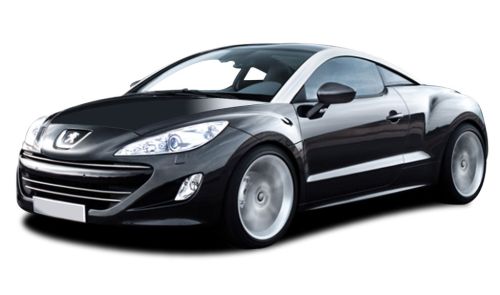
COMMENT: From planes to trains
Figures issued by the Association of Train Operating Companies (ATOC) last week confirm that both business and leisure travellers in the United Kingdom are using the railways for long distance travel more and more. Catching the train could soon be more popular than going by air on the main routes between the UK’s big cities if the shift from flying to the railways continues at its current rate. The fact that air travel is taxed (APD) whilst this is not the case for railways may have some influence.
The findings are based on a comparison of rail industry figures with those published by the Civil Aviation Authority (CAA), and confirm a long-term change in the nation’s travel patterns.
According to this analysis rail’s market share on the 10 most popular domestic air routes in 2010 grew to 44% – up from 29% in 2006. If the trend of recent years continues, train companies say that rail’s market share on these routes combined could rise to above 50% within the next 12 months, heralding a ‘turning point’ in how people travel between the UK’s main cities.
The assessment shows that rail has the largest market share on the London to Newcastle and London to Manchester service and rail’s overall market share on many of the remaining city pairs has seen increases over the same period, some of them significant.
Between 2006 and 2010, total journeys by rail on the routes rose by 42%, increasing by 2m to just over 7m journeys. Over the same period, the total number of comparable air journeys fell by 27%, or 3.25m, to around 9m in 2010. Over the last two years, there has been a particular surge in rail travel on these sectors with train journeys rising by 25%.
Sir Richard Branson took on British Airways and bmi with regard to international long haul air routes. He chose never to do so with regard to airline short haul operations instead using Virgin Rail as his flag bearer. After an unsteady start he is clearly winning, destroying bmi’s London to Glasgow service. As a result, bmi now operates just four domestic routes from Heathrow (Aberdeen, Belfast City, Edinburgh and Manchester), down from nine back in the summer of 2007.
Tough financial times, the increasing availability of cheap Advance fares – around 800,000 are sold each week – and the fact that train travel is often seen as a ‘greener’ option than flying, have all prompted the shift.
For example on London to Manchester, rail’s market share rose from 69% in 2008 to 79% in 2010. Long gone are the days when VLM (now CityJet Air France) could operate up to 12 daily sections between London City Airport and Manchester’s Ringway with very high load factors. The route has now been abandoned.
For Birmingham to Edinburgh, rail’s market share rose from 14% in 2008 to 31% in 2010. Here again the air services have been decimated now with only Flybe on the route, offering just five frequencies with a Bombardier Q400 service. On Birmingham – Edinburgh the road distance is 300 miles and five hours driving, as against a one hour flying time. But the train goes to the city centre saving time and money.
The more difficult the journey the more popular the air travel has been the rule in the past. This is changing too. Inverness to London survives but only to Luton and Gatwick. Plymouth, the West Country’s major city, and with notoriously difficult access to London by both road and rail has lost its air services (although a case could be made for a PSO (Public Service Obligation) route.
For London to Glasgow, rail’s market share has risen from 12% in 2008 to 20% in 2010. Here the road journey is seven hard hours and 400 miles. Virgin could bring the rail journey down to less than four hours in 2012, a tremendous breakthrough heralding an even greater transfer of allegiances. With the contract up for grabs next year and four European rail operators challenging the incumbent what a better way of demonstrating 14 years of real progress on the route and no change with the franchise.
On the East Coast the Government still has not issued a tender for the main charter following the collapse of National Express East Coast in November 2009. Currently the services are operated by a division of the Department for Transport with a nullifying effect on both marketing and investment. One can argue this licence should have taken priority for its future rather than the West Coast.
Planes v Trains. The battle will rage on. What will happen when/if High Speed 2 arrives. Nobody ever predicted planes would give way to trains as they surely will next year. Someone would have to be very brave to forecast the figures by the end of the decade.
Malcolm Ginsberg
Editor in Chief
Baltic Air Charter supports "Help for Heroes"
 “Help for Heroes” (H4H) which provides much needed support for wounded British servicemen and their families was the beneficiary of the Baltic Air Charter Association’s (BACA) Spring Lunch last week, held in the magnificent opulence of the Carpenters Hall in the City of London. Mark Elliot, Head of External Relations at the fund, gave a moving speech telling of the growth of H4H from its low key beginnings in October 2007. Since then it has raised £92m, of which 100% goes towards helping wounded servicemen and women.
“Help for Heroes” (H4H) which provides much needed support for wounded British servicemen and their families was the beneficiary of the Baltic Air Charter Association’s (BACA) Spring Lunch last week, held in the magnificent opulence of the Carpenters Hall in the City of London. Mark Elliot, Head of External Relations at the fund, gave a moving speech telling of the growth of H4H from its low key beginnings in October 2007. Since then it has raised £92m, of which 100% goes towards helping wounded servicemen and women.
The packed hall heard that BACA, founded in 1949 as an offshoot of the Baltic Exchange, the maritime organisation, was running at record numbers with 162 corporate member companies (including 15 new this year). It is essentially an organisation representing the ‘backroom’ people occupied with commercial aviation, particularly in the air charter industries and markets. Membership includes air brokers, charter airlines, airports, handling agents, FBOs and business aircraft operators, plus consultants involved with the industry. www.baca.org.uk www.helpforheroes.org.uk
Expedia and American Airlines
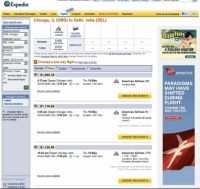 American Airlines has reached an agreement with Expedia to restore the online travel company's access to its fares and schedule information. The airline has been in a continuing feud since the beginning of the year with what is claimed to be the world’s largest organisation of its type regarding distribution costs and methods.
American Airlines has reached an agreement with Expedia to restore the online travel company's access to its fares and schedule information. The airline has been in a continuing feud since the beginning of the year with what is claimed to be the world’s largest organisation of its type regarding distribution costs and methods.
In January, Expedia dropped tickets for American Airlines from its listings, charging that the airline's new commercial strategy is "anti-consumer" and "anti-choice."
Expedia had stopped selling AA flights at the start of this year when the two companies fell out over AA’s plans to push sales through its own website, rather than through the GDS.
In a separate move Expedia, said it plans to split into two publicly traded companies through a proposed spin-off of its TripAdvisor business. www.aa.com www.expedia.com
Hong Kong gains the world's "highest" hotel
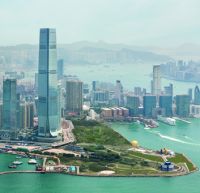 The Ritz-Carlton, Hong Kong, has opened, dominating the skyline as the world’s “highest” hotel. Located at the very top of the International Commerce Centre (ICC) in Hong Kong, occupying floors 102 to 118, the hotel is the newest addition to the brand’s growing global portfolio of 75 luxury properties and its 16th hotel in Asia.
The Ritz-Carlton, Hong Kong, has opened, dominating the skyline as the world’s “highest” hotel. Located at the very top of the International Commerce Centre (ICC) in Hong Kong, occupying floors 102 to 118, the hotel is the newest addition to the brand’s growing global portfolio of 75 luxury properties and its 16th hotel in Asia.
On the Kowloon side of Hong Kong, facing Victoria Island, the property replaces the old Ritz-Carlton on Connaught Road. Guests are welcomed into the arrival lobby on the 9th floor before being transported up to the hotel lobby on the 103rd floor.
The hotel’s 312 guestrooms all offer spectacular city and harbour views. Starting at 50sq m for a Deluxe Room, and reaching 365sq m for the magnificent Ritz-Carlton Suite, rooms provide state-of-the-art technology including wi-fi, iPod docking stations, blu-ray DVD players and flat screen TVs. In addition, Club room guests can enjoy the panoramic view from the Ritz-Carlton Club Lounge with complimentary food and beverage presentations 24 hours a day.
The hotel offers six dining venues including Ozone on the 118th floor which also hosts a fully equipped fitness centre and an indoor infinity pool. www.ritzcarlton.com
London City - Palma route expanded
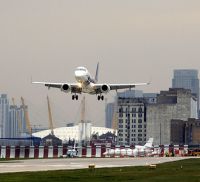 Established essentially as a business traffic airport London City is experiencing a minor boom with the Mediterranean leisure routes led by British Airways and its Embraer fleet. New services to Faro and Malaga have already been reported by AERBT.
Established essentially as a business traffic airport London City is experiencing a minor boom with the Mediterranean leisure routes led by British Airways and its Embraer fleet. New services to Faro and Malaga have already been reported by AERBT.
British Airways flies all year round to both Barcelona and Nice. During the summer Ibiza and Palma Majorca are added. Such has been the strength of forward bookings for the months of July and August Palma goes up to daily, except for Saturday. Ibiza remains at three times per week. In addition to the extra frequency British Airways will operate the flights using its fleet of larger 98-seat Embraer 190 jets in a two-class configuration.
The other London City main operator, Air France CityJet, is also experiencing a growth with what is essentially leisure traffic and destinations this summer include Avignon, Deauville, Nantes and Toulon. www.ba.com www.cityjet.com
Skyteam appoints new Managing Director
 Michael Wisbrun is to become Managing Director of Skyteam, the airline alliance headed by Air France and Delta Air Lines. He replaces Marie-Joseph Malé effective 1 June 2011. As head of the management team, based in the central office in Amsterdam, Mr Wisbrun will be responsible for implementing the future strategic plan as set forth by the SkyTeam Governing Board. He comes from KLM where he was instrumental in developing the KLM Northwest Joint Venture, the basis of the current transatlantic common enterprise with Delta, Air France, KLM and Alitalia.
Michael Wisbrun is to become Managing Director of Skyteam, the airline alliance headed by Air France and Delta Air Lines. He replaces Marie-Joseph Malé effective 1 June 2011. As head of the management team, based in the central office in Amsterdam, Mr Wisbrun will be responsible for implementing the future strategic plan as set forth by the SkyTeam Governing Board. He comes from KLM where he was instrumental in developing the KLM Northwest Joint Venture, the basis of the current transatlantic common enterprise with Delta, Air France, KLM and Alitalia.
Alongside Michael Wisbrun’s appointment, SkyTeam also announced that the position of Deputy Managing Director will be undertaken by Mr Su Liang a senior executive from China Southern. His broad perspective on the emerging Asia Pacific markets will clearly help SkyTeam’s growing presence in the region and assist in solidifying SkyTeam’s position in the greater China region. www.skyteam.com
TAM goes on London taxis
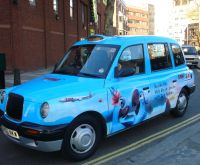 "Rio" animated feature film just released by 20th Century Fox, is being promoted by the Brazilian airline TAM using London taxi cabs. TAM flies to Rio de Janeiro daily from Heathrow and also daily to Sao Paulo.
"Rio" animated feature film just released by 20th Century Fox, is being promoted by the Brazilian airline TAM using London taxi cabs. TAM flies to Rio de Janeiro daily from Heathrow and also daily to Sao Paulo.
Directed by Brazilian Carlos Saldanha (the man responsible for the “Ice Age” trilogy), “Rio” is set in Cidade Maravilhosa (Wonderful City), as Rio is affectionately known.
Blu, voiced by Jesse Eisenberg, is a domesticated blue macaw, which never learned how to fly and lives in the United States. Its owner, Linda, believes it is the last one of its kind. When she discovers the existence of another macaw living in Rio de Janeiro, the two of them travel to the far-away, exotic land of Brazil to find Jewel (Anne Hathaway), the only female of the species.
Soon after their arrival, Blu and Jewel are kidnapped by a group of bird smugglers. With the help of Rafael (George Lopez) and a group of other birds Blu manages to escape. Now, with his new friends at his side, Blu will have to become brave and finally learn how to fly so that he can ruin the plans of the poachers who are chasing them. www.tam.com.br
World Airport Awards include Stansted
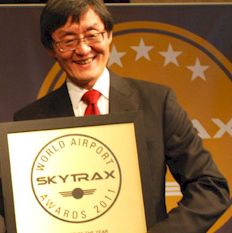 Skytrax, the Harley Street London-based air transport research organisation, perhaps better known for airline quality checks, has published its World Airport Awards for 2011 with Hong Kong taking first place. Sofitel Heathrow T5 won the Best Airport Hotel Europe category.
Skytrax, the Harley Street London-based air transport research organisation, perhaps better known for airline quality checks, has published its World Airport Awards for 2011 with Hong Kong taking first place. Sofitel Heathrow T5 won the Best Airport Hotel Europe category.
Other winners included Shanghai Hongqiao picking up Most Improved Airport, and London’s Stansted triumphing in the Best Airport For Low Cost Airlines category. Kuala Lumpur International Airport won Best Airport Immigration Service.
The World Airport Awards are the premier recognition of quality for the world's airport industry, assessing front-line customer service and general airport customer facilities. They are conducted without any outside sponsorship, and the costs of the survey are funded by Skytrax itself. www.worldairportawards.com
AND FINALLY: The Vickers Viscount
Through the wonders of YouTube we have discovered some historical film of the last ever Vickers Viscount flight into Heathrow in April 1996.
For aviation buffs it is well worth a look and features Sir George Edwards, the aircraft's chief designer; Sir Peter Masefield, Chairman of BEA during the Viscounts' sojourn with the airline; Lord King, then Chairman of British Airways; and Sir Ralph Robins, at the time Chairman of Rolls-Royce; plus Jock Bryce, the Vickers Test Pilot who partnered Matt Summers for the maiden flight on 16 July 1948.
The two short pieces are from The News at Ten and London Tonight, both on ITV. Overseeing the proceedings was Raymond Baxter, who himself was part of the Viscount team in the 1953 air race to New Zealand.
All concerned had to wait at the BA Heathrow engineering base for over two hours whilst the aircraft was flown down from Aberdeen due to the planned plane suffering damage at Stansted whilst being towed to a stand.
No histrionics at all from the distinguished senior aviation VIPS who waited. They rather enjoyed the compulsory chat time!
http://www.youtube.com/watch?v=tiBTO9DEJYk&feature=related
http://www.youtube.com/watch?v=uQLA817O2IM&feature=related
(If any reader is able to make the News at Ten pieces into one item and post it on YouTube it would be appreciated – please tell AERBT).
Readers might like to know that Capt Peter Cummings, Director of Operations, Bond Helicopters, will present the Alan Bristow Memorial Lecture at the Royal Aeronautical Society, Wednesday 20 April. “The Evolution, Development & Challenges of Commercial Air Ambulance Operations”. Entry is free at the Society No 4 Hamilton Place, London W1J 7BQ. Reserve your seat via conference@aerosociety.com
British Airways increase fuel surcharge
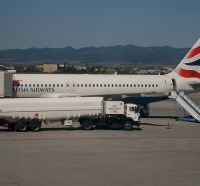 BA added another fuel surcharge to certain flights last Friday, the third increase in less than three months. Short haul and domestic UK passengers will escape these new charges. The increase on long haul non-premium tickets will increase by £10 per sector which means that for flights up to nine hours World Traveller passengers will pay £85 surcharge and for the longer services £98. With World Traveller Plus it is £95 and £116.50 respectively.
BA added another fuel surcharge to certain flights last Friday, the third increase in less than three months. Short haul and domestic UK passengers will escape these new charges. The increase on long haul non-premium tickets will increase by £10 per sector which means that for flights up to nine hours World Traveller passengers will pay £85 surcharge and for the longer services £98. With World Traveller Plus it is £95 and £116.50 respectively.
In a statement, Nick Swift, BA's Chief Financial Officer, said that the company regretted having to raise surcharges and were aware that these were difficult economic times.
He said: "For us, fuel now represents over one third of our costs and particularly affects our long haul flights.
We are very aware of the wider economic pressures on our customers at the moment and we will bear the vast majority of the recent fuel price rise ourselves to keep this increase in surcharge to a minimum.”
First and Club World flights under nine hours will increase from £105 per sector to £125. Flights of more than nine hours will increase from £125 per sector to £145 or £290 for a return trip. www.ba.com
Flying Matters crashes
 Pro air transport UK lobbying group Flying Matters is to be wound up at the end of April. This follows disagreement between senior corporate members of the organisation, which was chaired by former Labour Energy Minister Brian Wilson. This was particularly with regard to APD (Air Passenger Duty) where leading members easyJet and Virgin Atlantic disagreed over whole plane tax (with easyJet in favour and Virgin against). The organisation did cover a wide spectrum of the industry, including both British Airways and Unite, but there was an argument that Flying Matters carried little weight or influence.
Pro air transport UK lobbying group Flying Matters is to be wound up at the end of April. This follows disagreement between senior corporate members of the organisation, which was chaired by former Labour Energy Minister Brian Wilson. This was particularly with regard to APD (Air Passenger Duty) where leading members easyJet and Virgin Atlantic disagreed over whole plane tax (with easyJet in favour and Virgin against). The organisation did cover a wide spectrum of the industry, including both British Airways and Unite, but there was an argument that Flying Matters carried little weight or influence.
A number of non-partisan aviation groups do exist with some more influential than others including The Airport Operators Association (AOA), British Air Transport Association (BATA), Baltic Air Charter Association (BACA), Board of Airline Representation UK (BAR UK), British Business and General Aviation Association (BBGAA) and Heathrow First. Flying Matters included such diverse organisations as The African Organic Farmers Association and tourism body ABTA. Any future lobbing group is expected to be formed around a more focused alliance. Vital is the selection of the individual to lead such a coalition, common consensus being that British aviation is currently lacking such a person. www.flyingmatters.org.uk
Irish problems manifest
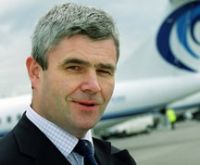 At the same time as Aer Lingus reports a poor performance for March Aer Arran has announced that it is dropping several regional routes from Dublin to the west of Ireland.
At the same time as Aer Lingus reports a poor performance for March Aer Arran has announced that it is dropping several regional routes from Dublin to the west of Ireland.
Aer Lingus says that booked passenger figures fell by 8.4% to 716,000 in March split between short haul and long haul. The airline points out that while the Easter holiday began in the last week of March in 2010, this will not occur until late April this year. The booked load factor in March for Aer Lingus decreased by 3.7 points on to 72.2%.
Aer Arann Chairman Pádraig Ó Céidigh has confirmed that the airline's routes from Sligo and Knock to Dublin will end from 21 July. He had earlier said that the service from Galway to Dublin would cease after mid-July. The Aer Arann Chairman noted that there were currently no negotiations under way with the Department of Transport in relation to an extension to the current PSO (Public Service Obligation) contract, which provides subsidies for some regional routes. With a new Government in place obliged to deal with Ireland’s economic problems the dropping of the subsidy on these routes came as no surprise. www.aerlingus.com www.aerarann.com
Lufthansa revamps its Boeing 747 cabins
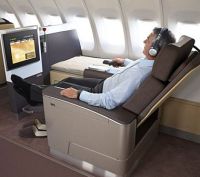 Clearly with the long-awaited introduction of the Boeing 747-8 Intercontinental in mind later this year Lufthansa has started the complete revamp of ten current Dash 400 series aircraft. All the aircraft will be completed by November.
Clearly with the long-awaited introduction of the Boeing 747-8 Intercontinental in mind later this year Lufthansa has started the complete revamp of ten current Dash 400 series aircraft. All the aircraft will be completed by November.
The highlight of the upgrade, which involves all cabins, is a reduction in First Class from 16 passengers to just eight. This will ensure a quieter and more exclusive atmosphere. The window seats will be converted into full-length, lie-flat beds with a sleeping surface measuring over two metres in length and a top-quality mattress, guaranteeing first class sleeping comfort. Each passenger in the new First Class cabin will thus not only have a seat but also a separate bed. Sound-absorbing curtains and sound-deadening insulation beneath the carpet will ensure that passengers enjoy the necessary peace and quiet. As a hallmark of Lufthansa’s First Class service, top-of-the-range materials such as matt-brushed metal and scarred leather have been used throughout the cabin.
The Business and Economy Class cabins on the Boeing 747-400 are also being refurbished. The entrance area will be revamped in the latest design, and new lavatories will be installed. In Economy Class, passengers can put together their own entertainment programme on the back-seat monitor. www.lufthansa.com
South American rush continues
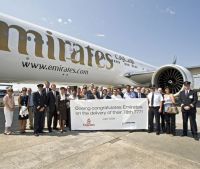 Emirates Airline is joining the rush of new services to South America in pursuant of the 2014 World Cup and Brazil’s expanding economy. The Dubai-based airline has flown non-stop to Sao Paulo since 2007.
Emirates Airline is joining the rush of new services to South America in pursuant of the 2014 World Cup and Brazil’s expanding economy. The Dubai-based airline has flown non-stop to Sao Paulo since 2007.
From 3 January 2012 Emirates will operate a daily direct flight from Dubai to Rio de Janeiro and on to Buenos Aires . Flight time to Rio is around 14 hours and back non-stop from the Argentine capital 15 hours. The Boeing 777-300ER is expected to be configured with the usual three-class Emirates set-up. Cargo will play an important part in making the operation viable with fruit and vegetables an important Middle East market from South America.
Brazil stands as one of the world’s fastest-growing economies, thanks to its success in the petroleum sector and a young and active workforce. According to the Arab Brazilian Chamber of Commerce, exports to Arab countries totalled US$12.57bn in 2010, representing an annual growth of 34%, while imports ended the year with US$6.96bn, an increase of 33% compared to 2009. Argentina has also experienced positive economic growth in 2010. Tourism, one of the country’s major economic drivers, is a good indicator. www.emirates.com
United States publishes 2010 visitor figures
 The US Department of Commerce has released its 2010 report on International visitation, noting a record 60m visitors 5m more than the previous year.
The US Department of Commerce has released its 2010 report on International visitation, noting a record 60m visitors 5m more than the previous year.
In 2010, the top inbound markets continued to be Canada and Mexico, both of which were up in arrivals along with eight of the nine overseas regional markets. Non-resident visits from Canada, which set a record in 2010, and Mexico were up 11% and 1%, respectively. Excluding Canada and Mexico overall arrivals from overseas markets accounted for 44% of the total.
Country by country the figures made some interesting reading with the United Kingdom still the biggest market with 3.85m arrivals, but the only major country showing a drop, 1.2%. Next up was Japan, and here the growth is a mighty 16% (3.38m) but this likely to fall drop away in 2011 due to the earthquake problems. Germany is less than half of the UK at 1.72m (+2.3%) and France seeing 11.4% increase at 1.34m.
How the balance of the world economies is changing can be shown with Brazil now seventh in the pecking order (1.19m +34%) and China with a 52% rise and 800,000 visitors to the United States. www.tinet.ita.doc.gov
ON TOUR: Aircraft Interiors Expo Hamburg
 Premium Economy is here to stay, seats may have reached the limit of their ‘thinness’ and the IFE (in-flight entertainment) market could be about to experience seismic change. This was the opening day’s message at last week’s Aircraft Interiors Expo, its tenth exposé at Hamburg Messe.
Premium Economy is here to stay, seats may have reached the limit of their ‘thinness’ and the IFE (in-flight entertainment) market could be about to experience seismic change. This was the opening day’s message at last week’s Aircraft Interiors Expo, its tenth exposé at Hamburg Messe.
An industry panel set any scepticisms about Premium Economy/Economy Plus firmly straight by confirming that it is not only here to stay but may hold further opportunities to be explored.
Alex Hervet, Long Haul Products Director at Air France, said that 600,000 passengers had already flown on the airline’s Premium Voyager service since its launch in late 2009 and that the airline now has Premium Voyager across 90% of its fleet. “Next month we are receiving our fifth A380 aircraft and this will be the first one to have Premium Voyager onboard.”
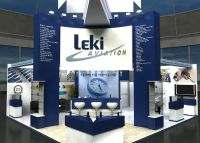
Figures published show that for every four passengers who fly for business purposes, three of them are in Economy seats – pointing to a significant growth potential for this segment of the cabin space.
Legroom and seating was also raised as an issue. Airbus Head of Aircraft Interiors Marketing, Bob Lange, said that he felt it was now mathematically impossible to make seat-backs any thinner than the latest products already offer.
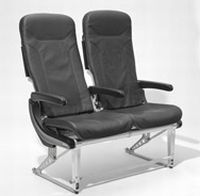 Tom Plant, VP & General Manager Seating Products at B/E Aerospace said that he thought it was entirely possible that a 28 inch pitch could become standard for economy use in the future, thanks to the latest seating technology. He said: “The challenge is still long-term comfort in that area – a true judge of how comfortable a seat is means it needs to still be comfortable after three months, six months and a year’s worth of use – if it’s still comfortable after that then you have a great product.”
Tom Plant, VP & General Manager Seating Products at B/E Aerospace said that he thought it was entirely possible that a 28 inch pitch could become standard for economy use in the future, thanks to the latest seating technology. He said: “The challenge is still long-term comfort in that area – a true judge of how comfortable a seat is means it needs to still be comfortable after three months, six months and a year’s worth of use – if it’s still comfortable after that then you have a great product.”
In the in-flight entertainment arena, Lumexis’s CEO Doug Cline, noted that IFE was getting ready for another seismic change with new companies coming into the market with innovations – the big question was who was going to survive? He said: “Suppliers have to drive down to the lowest cost of purchase, the lowest cost of maintenance and highest levels of reliability.”
Bob Lange commented that cost was also a major factor for airlines saying that the annual costs to maintain IFE could be as much as an aircraft engine. “It’s important for airlines to make the right decisions from the beginning,” he said.
John Yeng added: “There are many companies with emerging IFE technologies – we are looking for partners that can offer reliable products that can be delivered to market in the quickest way.”
A new rest room on board
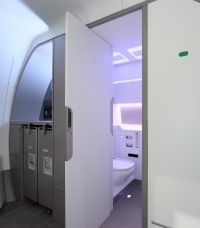 With all shows it is difficult to find one outstanding item from many that are innovative and may well make their way into production. However a market research mock-up of a space-saving rear toilet and galley concept for the Airbus A320 Family caught the eye.
With all shows it is difficult to find one outstanding item from many that are innovative and may well make their way into production. However a market research mock-up of a space-saving rear toilet and galley concept for the Airbus A320 Family caught the eye.
Called Space-Flex, the concept makes more efficient use of the volume at the rear of the cabin. The result: two rest rooms plus a galley can now be accommodated in this space, offering airlines the possibility to install up to three more revenue-generating seats in the cabin and/or to improve seat pitch. One of the Space-Flex lavatories provides full access for ‘Persons with Reduced Mobility’ (PRM) through a simple conversion process: an industry first on a single-aisle aircraft.
 Other innovative new products demonstrated include a drinks trolley that could revolutionise the way beverages are served on board aeroplanes. The Sky-Tender has been developed by SkyMax and Air-Eltec Luftfahrtelektrik and can produce up to 30 different drinks including tea, coffee, soft drinks, wine and beer – at the touch of a button. The system has excellent green credentials because it will significantly reduce the amount of bottles and cans that are traditionally needed for each drinks service. Less waste means a saving on weight and also frees up storage space on board. It also means a speedier service – drinks are delivered quickly by the automated system – and airline staff no longer need to rummage around in trays looking for a passenger's preference.
Other innovative new products demonstrated include a drinks trolley that could revolutionise the way beverages are served on board aeroplanes. The Sky-Tender has been developed by SkyMax and Air-Eltec Luftfahrtelektrik and can produce up to 30 different drinks including tea, coffee, soft drinks, wine and beer – at the touch of a button. The system has excellent green credentials because it will significantly reduce the amount of bottles and cans that are traditionally needed for each drinks service. Less waste means a saving on weight and also frees up storage space on board. It also means a speedier service – drinks are delivered quickly by the automated system – and airline staff no longer need to rummage around in trays looking for a passenger's preference.
Seat specialist Recaro introduced its new Economy Class seat Basic Line 3520. The company says it has managed to significantly reduce the weight of each seat unit to less than 11kg – making it 30% lighter than the previous model. This was achieved by combining high-tech materials with intelligent design. Another key feature of the new seat is that it offers passengers more living space by including a higher literature pocket which is positioned above the tray table instead of in the knee area.
 Contour Aerospace was showcasing a futuristic video gaming station concept. Known as ‘Not For Wimps’ the concept was developed in conjunction with Factorydesign and features a dramatic arc of composite Kevlar and carbon fibre that curves over the top of a bucket seat creating a personal canopy feel. Ideal for passengers looking for a serious gaming experience during a long Business or First Class flight, the seat includes a state-of-the art monitor and gives the impression of being almost cocooned from the rest of the cabin; speakers are integrated into the top edges of the seat and active noise cancellation is built-in to avoid the necessity for headphones, although they can be worn if preferred.
Contour Aerospace was showcasing a futuristic video gaming station concept. Known as ‘Not For Wimps’ the concept was developed in conjunction with Factorydesign and features a dramatic arc of composite Kevlar and carbon fibre that curves over the top of a bucket seat creating a personal canopy feel. Ideal for passengers looking for a serious gaming experience during a long Business or First Class flight, the seat includes a state-of-the art monitor and gives the impression of being almost cocooned from the rest of the cabin; speakers are integrated into the top edges of the seat and active noise cancellation is built-in to avoid the necessity for headphones, although they can be worn if preferred.
Will ‘Not For Wimps’ make it into a scheduled airliner of the future, we shall see? Hamburg Messe is a shop window for the industry and rather like its motoring equivalent Geneva, not every thing you see is for real. But that is ‘show business’.


